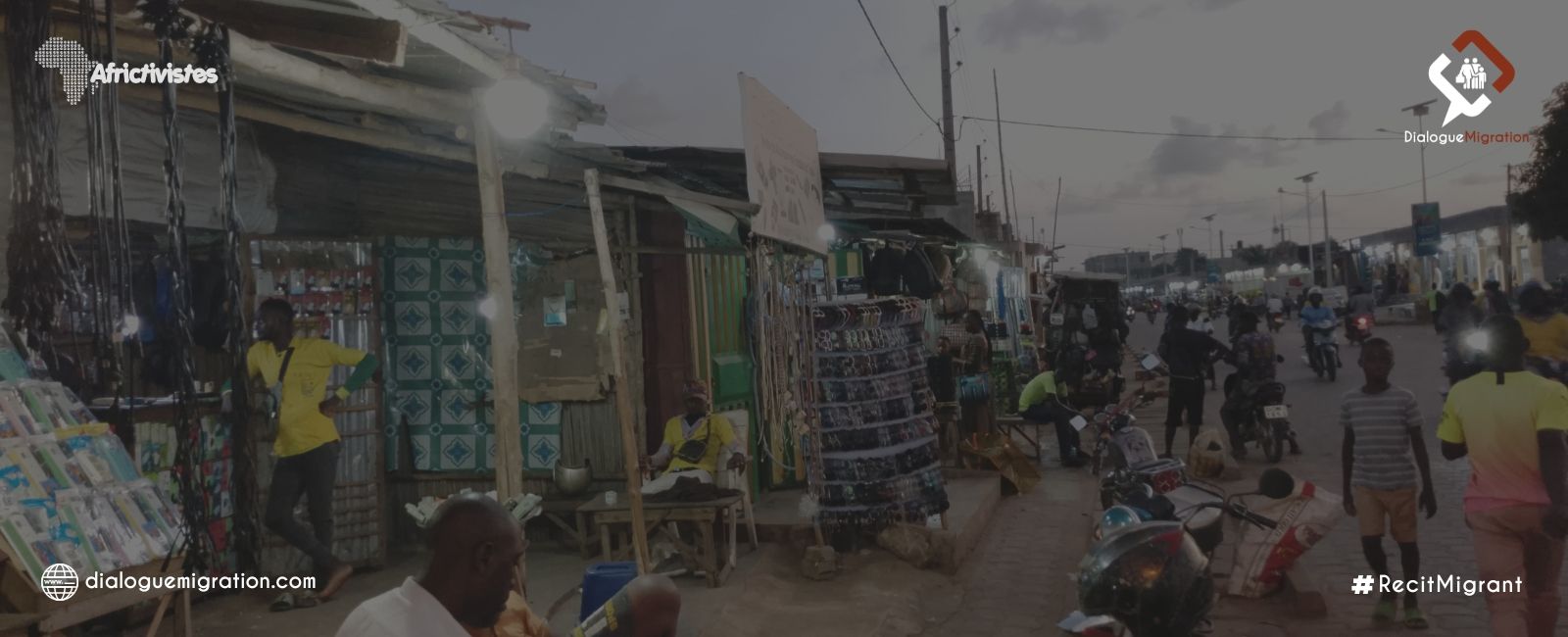

On the outskirts of Cotonou in Benin, precisely at the Carrefour Tankpè, is a renowned commercial space due to the strong presence of the Nigerien community that has established its business there. All kinds of items from clothing and telephone accessories to electrical and electronic equipment are available to consumers. Dialogue Migration immerses you in this economically rich and culturally fertile cosmopolitan universe.
By Angel Banouwin
On this day of May 2023, the atmosphere is as usual at the rendez-vous at the Carrefour Tankpè, a commercial space animated by a large Nigerien community living on Beninese soil, in the commune of Abomey-Calavi, Cotonou’s dormitory town.
On either side of the paved lane from the Carrefour Tankpè to the Maria-Gleta Power Station, there are about twenty shops where you can find a little bit of everything. From electrical equipment to household appliance accessories, and phones, bags, suitcases, glasses, sports jerseys, shoes … The price of common items is attractive enough to go unnoticed.
Between the arrivals and departures of customers, some on motorcycle or car and others on foot, haggling is linked to the cost of the products on sale. The “Babas” (Editor’s note: name of the Hausa Muslim communities from the north of the country), as they are called here, are in the care of their customers. A request for an item and its price here, impeccable shoe polish offered there, fitting items or visiting the stalls here and there bring the place to life.
Abdoulaye Issiaka, beauty accessories’ street vendor (earrings, watches, bracelets and others) takes care of his glass briefcase with meticulousness. Sitting with some of his peers, he enthusiastically presents his business. “In the morning, I pick up this briefcase to go around the neighborhoods in search of potential customers,” he explains.
A few hours later, at around 5:30 p.m, he returned to a store owned by a close relative. Issiaka is self-employed, but from time to time he replaces this relative to continue selling items at a price he controls. “I’ve been here for about 7 years. And that’s the work I do,” he says.
Sometimes, the street vendors return to the carrefour after their rounds of the neighborhoods, some carrying their display cases, others carrying a cobbler’s toolbox, and some with their pushcarts. Some take that time to rest, while others return to the sales area. Meanwhile, people sitting in front of stalls are deep in conversation in Zerma language.
Customers are delighted with the proximity and service provided by the Niger community’s range of shops. “Their presence means we can quickly find what we need when we leave home. I find them welcoming, even if they sometimes overcharge for items. They can charge double the real price, and if you’re not used to their way of selling, you’ll think it’s expensive. But after bargaining, we find an acceptable price,” explains Roger Zinsou, a Beninese man who has come to pay for an undergarment.
Compared with the fixed prices of conventional stores, which are impossible to haggle over, haggling is a good reason that attracts bargain-hunters too.
Further down the street, Harouna Youssouf runs a store that his father set up over two decades ago. The latter is also involved in other trading activities in Cotonou’s Dantokpa market. “I’m not the first to be here. There was someone else before me. When I leave, someone else will come. I’ll be gone for a year and a half before coming back. We go out into the field…”, he explains.
Speaking of his relationship with customers, he shares that it’s something that requires patience. ” If you don’t have patience, you can’t sell. Lots of people buy products and then return them to us,” he says.
Remaining silent for fear of reprisals
It’s hard to get a comment out of some people once they know the reason for our reporter’s visit. “The company director isn’t here, I’m just the supervisor”; “I don’t speak French very well, go and see whoever is here, he’ll be able to talk to you”. Members of the foreign community living on Beninese soil avoid most exchanges for fear of getting into trouble.
They are reluctant to express their views on certain subjects for fear of triggering unrest between the two countries, which would be their greatest loss. From one tenant to another, without much of a filter, Yazid Abdallah decides to open up, but hesitates before redirecting us to one of his “brothers”, Aboubakari Hassan. The latter deems it necessary, before answering our questions, to begin with prayers, in order to avoid any controversial subject or one likely to cause disaffection and, by extension, to his community.
To the best of his recollection, no press coverage has been given to their community since he joined the industry, even though he has clients and friends in the media. Better still, he’s the oldest member of the community on the premises.
The origins of a commercial hub
Aboubakari Hassan is one of the oldest members of his community living at Carrefour Tankpè. As such, he goes back in time to tell us about the first settlements of Nigeriens in Tankpè, Benin. “Before, there were six of us. Three people on each side and there wasn’t a large yard. Instead, there were mango trees and cornfields. Today, it has become a big town with paved streets. I remember we used to test light bulbs with a multimeter,” he recalls.
Aboubakari Hassan, sells electrical equipment, light bulbs, extension cords and others. “I’ve been here since 2002, it’s been 21 years. I know everywhere here,” he says. Of all his father’s children, about twenty, Hassan is the only one who did not attend French school. According to him, his father decided that he attends a Qur’anic school. He slowly learned French on the job in Benin to run his small business with a predominantly French-speaking clientele. “There are several prominent people to whom I have sold electrical equipment for their building sites”, he says, expressing the relationships he has forged with Beninese nationals, with whom he maintains a trust, friendship and fraternity relationship.
During the conversation, one of his children, a little boy, comes home from school. He snatches the phone away and starts playing with it. “This is my child, he was born in Benin, he’s not the only one, there are three of them,” says Aboubakari Hassan. He continues: “My children were all born here. My wife is from Savè in Benin. I went back to Niger once, with my children and their mother, to show them my origins and my parents’ home. But my wife and children are Beninese. I myself have already been informed of the steps to take if I want to have citizenship,” he confides, full of enthusiasm.
A cosmopolitan vision of the world
Hassan, like most of his fellow countrymen living in Benin, has a cosmopolitan view of the world. “Africa is made up of the same people. In the past, there was no Benin or Niger, it was a colony. Back then, my father, who was a war veteran, was sent to Dakar, then, after training, to Martinique. On his return, he was one of the very first customs officers in Niger,” he recounts. He goes on to complain about the borderline xenophobic behaviour of some host-citizens. “There are customers who come to bother us, reminding us that we’re in Benin, and I don’t belong here, ‘Baba’. They tell me they’re going to cause trouble,” he laments.
However, by nurturing peace within himself, Hassan says he has noticed a marked improvement in this deplorable state of mind over the years. “Even if someone comes here to raise a fuss, he no longer insists that we go to the police station. Because he knows that summonses aren’t issued like they used to be. Even if it’s a policeman, he’s not going to come and cause you problems? That’s changed,” he admits in delight.
Time passes and the day comes to an end at the shopping centre. Members of the Niger community prepare for evening prayer in the hope of starting a new day’s trading the following day.
Niger has a strong community in Benin. In this neighbouring country, it has two diplomatic representations: an embassy in Cotonou and a consulate in Parakou. There are also Hausa and Zerma speakers in both countries, some of whom are separated from their close relatives only by the River Niger.


